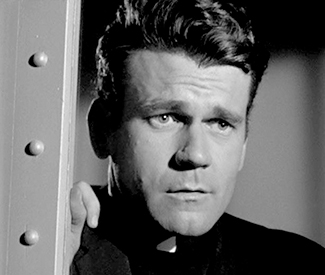arts@sfbg.com
FILM “Introducing Hollywood’s newest hunk-a-man!” crowed the ads for 1956’s Bus Stop, in which Don Murray made his film debut as the cowpoke besotted with Marilyn Monroe’s movie-mad hick — a plum role in a big hit opposite the reigning box-office queen. The actor even got an Oscar nomination for this start at the tippy-top. But he didn’t stay there long.
What happened? With “A Special Weekend With Don Murray … America’s Least-Remembered Movie Star,” the Roxie aims to provide an answer. The event is part of a larger project set to culminate by year’s end with the premiere of Don Malcolm’s feature Unsung Hero, a documentary tribute to “The Extraordinary Times and Exemplary Life” of the aforementioned. Both doc and retrospective feature an ad line, “He went from acclaim to obscurity in the blink of an eye,” that — like many of their subject’s performances — goes a bit hyperbolically overboard with the best intentions. Murray’s descent was gradual, owing mostly to some noble but commercially shaky vehicle choices. Even with better luck, would he have remained on Hollywood’s fickle casting A-list much longer? The “14 provocative performances” the Roxie revives this weekend suggest probably not.
Arriving post-Brando, pre-New Hollywood, he now looks like a transitional figure: Capable, earnest yet effortful, too often trying to overcome his classic leading-man looks via Actor’s Studio-style “intensity” that then passed as being more “real,” but now looks far from natural. The only child of stage veterans, Murray made his Broadway debut in Tennessee Williams’ 1951 The Rose Tattoo at age 21. After several years’ relief work as a Korean War conscientious objector, he’d barely resumed his career before Bus Stop put it in hyperdrive. After that smash, he could have done anything he liked. What he chose, however, was invariably heavier and less populist: Somber, “daring” issue-oriented dramas that required him to flex acting muscles as men torn between one thing (good) and another (bad). They were respectably received, but seldom attracted the rave reviews, awards or audiences hoped for.
Like Oscar-winning Marty (1955) before it, 1957’s The Bachelor Party was a big-screen version of a TV script by Paddy Chayefsky in his pathos-de-la-Average-Joe mode, with Murray as a young office worker panicked by his wife’s unexpected pregnancy. The same year’s A Hatful of Rain had him as a morphine-addicted Korean War vet sweating out another long dark night of the soul. Amid much theatrical hand-wringing, Tony Franciosa’s concerned brother is so hammy he required the balm of his own Oscar nomination. After a couple of ambitious Westerns and prestige TV plays, Murray portrayed an American medical student who winds up fighting for 1920s IRA leader James Cagney in Shake Hands With the Devil (1959). A good movie about another unpleasant subject, it was not a success.
So it was back to the Old West (in 1960’s One Foot in Hell, a title descriptive of all his roles then) before the actor realized a pet project he also produced and co-wrote. The Hoodlum Priest (1961) had him as a Jesuit rehabilitating ex-cons in St. Louis, including pre-2001 Keir Dullea’s surly delinquent. Melodramatic yet reasonably fresh thanks to future Empire Strikes Back (1980) director Irvin Kershner’s vivid location shooting, it was nonetheless poorly received — not least by its real-life inspiration, who found this screen portrait objectionable enough to sue over.
Fortunately 1961 also brought the actor his biggest hit since Bus Stop. He was the idealistic junior Senator who ends up paying the ultimate price for dirty Beltway politics (committing suicide when blackmailed over a past gay fling) in Otto Preminger’s all-star Advise & Consent. Yet apart from 1965 Steve McQueen vehicle Baby the Rain Must Fall (from which much of his part was cut), he didn’t appear in another major release until 1972’s Conquest of the Planet of the Apes — in which his monkey-hating mayor provided a cartoonish metaphor for the actor’s passionate interest in racial equality.
Between routine B movie and television assignments, several projects reflected that personal crusade. Crudely made but interesting 1967 indie Sweet Love, Bitter had him as an alcoholic jazzbo slumming on the Skid Row “wild side” his musician idol (Dick Gregory) can’t escape. Short-lived ABC series The Outcasts paired his former slave owner with Otis Young’s ex-slave as reluctant bounty-hunting partners after the Civil War. The unreleased Call Me By My Rightful Name reunited them as two sides of an interracial triangle, vying for white chick Cathy Lee Crosby.
Murray donned the cloth again to shepherd more little urban toughs (including Erik Estrada) in 1970’s The Cross and the Switchblade, his camp-classic directorial debut. He acted as if his life depended on it — i.e., with a little too much desperation — as a self-destructive rodeo clown in Cotter (1973) and a proto-Bad Lieutenant in Deadly Hero (1975), but hardly anyone noticed. Through nearly all of this he wrangled with The Confessions of Tom Harris, another criminal-redeemed-by-Christ story that was primarily shot (very poorly) by future Bo Derek mentor John Derek in 1966, then reworked and retitled (Childish Things, Tale of the Cock) for years afterward. It, and the even more obscure Call Me, will get rare screenings at the Roxie this weekend, alongside TV episodes and clips as well as most of the above-mentioned features.
There will also be Murray himself, who’ll turn a very hale 85 at month’s end. While he stayed fairly busy with medium-profile roles mostly on TV through millennium’s turn, the latest piece in the Roxie program dates from 33 years ago, and is probably still the movie anyone under 70 would be likeliest to remember him for: The original Endless Love (1981), in which his mean rich dad is the major obstacle between Brooke Shields and Martin Hewitt, eventually causing the latter to go pyro. *
“A SPECIAL WEEKEND WITH ACTOR DON MURRAY”
Fri/11-Sun/13, $6.50-$11
Roxie Theater
3117 16th St, SF

